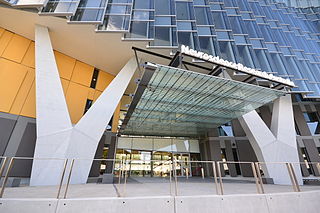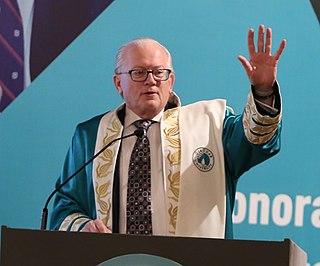
The National Institute of Neurological Disorders and Stroke (NINDS) is a part of the U.S. National Institutes of Health (NIH). It conducts and funds research on brain and nervous system disorders and has a budget of just over US$2.03 billion. The mission of NINDS is "to reduce the burden of neurological disease—a burden borne by every age group, every segment of society, and people all over the world". NINDS has established two major branches for research: an extramural branch that funds studies outside the NIH, and an intramural branch that funds research inside the NIH. Most of NINDS' budget goes to fund extramural research. NINDS' basic science research focuses on studies of the fundamental biology of the brain and nervous system, genetics, neurodegeneration, learning and memory, motor control, brain repair, and synapses. NINDS also funds clinical research related to diseases and disorders of the brain and nervous system, e.g. AIDS, Alzheimer disease, epilepsy, muscular dystrophy, multiple sclerosis, Parkinson disease, spinal cord injury, stroke, and traumatic brain injury.
The National Institute of Mental Health (NIMH) is one of 27 institutes and centers that make up the National Institutes of Health (NIH). The NIH, in turn, is an agency of the United States Department of Health and Human Services and is the primary agency of the United States government responsible for biomedical and health-related research.
Biological psychiatry or biopsychiatry is an approach to psychiatry that aims to understand mental disorder in terms of the biological function of the nervous system. It is interdisciplinary in its approach and draws on sciences such as neuroscience, psychopharmacology, biochemistry, genetics, epigenetics and physiology to investigate the biological bases of behavior and psychopathology. Biopsychiatry is the branch of medicine which deals with the study of the biological function of the nervous system in mental disorders.

The Institute of Psychiatry, Psychology and Neuroscience (IoPPN) is a research institution dedicated to discovering what causes mental illness and diseases of the brain. In addition, its aim is to help identify new treatments for them and ways to prevent them in the first place. The IoPPN is a school of King's College London, England, previously known as the Institute of Psychiatry (IoP).

The Florey Institute of Neuroscience and Mental Health, more commonly known as the Florey Institute, is an Australian medical research institute that undertakes clinical and applied research into treatments for brain and mind disorders and the cardiovascular system. The Institute's areas of interest include Parkinson's disease, stroke, motor neurone disease, traumatic brain and spinal cord injury, addiction, epilepsy, multiple sclerosis, brain development in premature babies, Huntington's disease, depression, schizophrenia, brain function in health and disease, heart failure, and dementia.
Biological psychopathology is the study of the biological etiology of mental illnesses with a particular emphasis on the genetic and neurophysiological basis of clinical psychology. Biological psychopathology attempts to explain psychiatric disorders using multiple levels of analysis from the genome to brain functioning to behavior. Although closely related to clinical psychology, it is fundamentally an interdisciplinary approach that attempts to synthesize methods across fields such as neuroscience, psychopharmacology, biochemistry, genetics, and physiology. It is known by several alternative names, including "clinical neuroscience" and "experimental psychopathology." Due to the focus on biological processes of the central and peripheral nervous systems, biological psychopathology has been important in developing new biologically-based treatments for mental disorders.

Thomas Roland Insel is an American neuroscientist and psychiatrist who led the National Institute of Mental Health (NIMH) from 2002 until November 2015. Prior to becoming Director of NIMH, he was the founding Director of the Center for Behavioral Neuroscience at Emory University in Atlanta, Georgia. He is best known for research on oxytocin and vasopressin, two peptide hormones implicated in complex social behaviors, such as parental care and attachment. He announced on Sept. 15, 2015, that he was resigning as the director of the NIMH to join the Life Science division of Google X. On May 8, 2017, CNBC reported that he had left Verily Life Sciences. Insel is a Co-founder with Richard Klausner and Paul Dagum of a digital mental health company named "Mindstrong," a Bay-area startup. He has also co-founded NEST Health, Neurawell Therapeutics, and Cortical Capital.
The Semel Institute for Neuroscience and Human Behavior is a research institute of the University of California Los Angeles (UCLA). It includes a number of centers, including the "Center for Neurobehavioral Genetics", which uses DNA sequencing, gene expression studies, bioinformatics, and the genetic manipulation of model organisms to understand brain and behavioral phenotypes.

Neuroscience Research Australia is an independent medical research institute based in Sydney, Australia. Previously called the Prince of Wales Medical Research Institute, the institute relaunched as Neuroscience Research Australia on 1 June 2010. NeuRA is accredited by the National Health and Medical Research Council.
Clinical neuroscience is a branch of neuroscience that focuses on the scientific study of fundamental mechanisms that underlie diseases and disorders of the brain and central nervous system. It seeks to develop new ways of conceptualizing and diagnosing such disorders and ultimately of developing novel treatments.
Dilip V. Jeste, M.D. is an American geriatric neuropsychiatrist, who specializes in successful aging as well as schizophrenia and other psychotic disorders in older adults. He is Senior Associate Dean for Healthy Aging and Senior Care, Distinguished Professor of Psychiatry and Neurosciences, Estelle and Edgar Levi Memorial Chair in Aging, Director of the Sam and Rose Stein Institute for Research on Aging, and Co-Director IBM-UCSD Artificial Intelligence Center for Healthy Living at the University of California, San Diego School of Medicine.
The following outline is provided as an overview of and topical guide to psychiatry:
Sir Michael John Owen is a Welsh research scientist in the area of psychiatry, currently the head of the Division of Psychological Medicine and Clinical Neurosciences at Cardiff University.
Professor Susan Rossell is a British researcher based at Swinburne University of Technology specialising in Neuropsychology and Neuroimaging. Originally from Nottingham, UK; she now resides in Melbourne, Australia. Her research on the neuropsychology of schizophrenia and body dysmorphic disorder is internationally recognised.
Elizabeth Scarr is an Australian scientist. Her research investigates the chemical changes in the brain associated schizophrenia and bipolar disorder.

Lori Altshuler was a Professor at the University of California, Los Angeles (UCLA) Department of Psychiatry and Biobehavioral Sciences and held the Julia S. Gouw Endowed Chair for Mood Disorders. Altshuler was the Director of the UCLA Mood Disorders Research Program and the UCLA Women's Life Center, each being part of the Neuropsychiatric Hospital at UCLA.

Stephen Michael Stahl is an author and professor of psychiatry with expertise in psychopharmacology. He is currently a Professor at the University of California, San Diego and serves as Honorary Fellow in psychiatry department at the University of Cambridge. He is also the chairman of Neuroscience Education Institute (NEI) and Arbor Scientia Group.
Sabine Bahn is a professor of Neurotechnology, Professor & Director of the Bahn Laboratory at The University of Cambridge, a Professor of Translational Neuropsychiatry at Erasmus Medical Centre

Joseph Thomas Coyle Jr. born in Chicago, Illinois, is a psychiatrist and neuroscientist that is known for his work on the neurobiology of mental illness, more specifically on schizophrenia. He is currently the Eben S. Draper Chair of Psychiatry and Neuroscience at Harvard Medical School in Boston, Massachusetts.

Zucker Hillside Hospital is a psychiatric facility that opened in 1926, relocated to its present address in 1941, and was renamed in 1999 to its present name.








